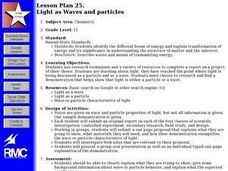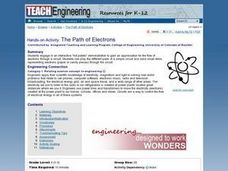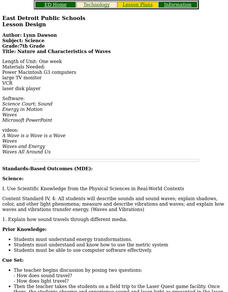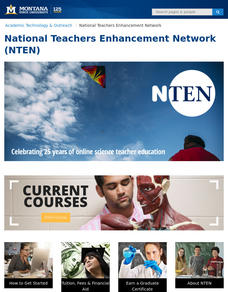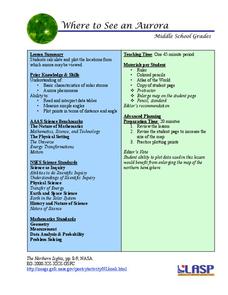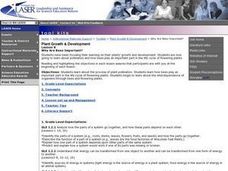Curated OER
Transformation of Energy-8th Grade
Eighth graders examine how electricity is produced in relation to the atom as well as what causes electric current to flow and what determines how much current flows through a circuit. These and other concepts of transformation of energy...
Curated OER
Light as Waves and Particles
Eleventh graders explore the wave and particle properties of light.
Curated OER
The Path of Electrons
Students engage in an interactive "hot potato" demonstration to gain an appreciation for the flow of electrons through a circuit. They role play the different parts of a simple circuit and send small items representing electrons (paper...
Curated OER
Completing the Circuit
Students use a battery, wires, small light bulb and a light bulb holder to learn the difference between an open circuit and a closed circuit, and understand that electric current only occurs in a closed circuit. They describe the...
Curated OER
Simple Circuits
Fifth graders investigate simple circuits and identify when a circuit is considered opened or closed. In small groups, they experiment with wires, batteries, and light bulbs to identify how to light the bulb. Students also experiment...
Curated OER
Applied Science - Technology (3A) Pre Lab
Third graders discuss electric currents. In this circuit lesson, 3rd graders create a picture of a battery circuit and a light bulb. They show the positive and negative charge and the flow of electrons.
Curated OER
Circle of Life
Students consider why we eat and where our food obtains its energy. They illustrate food chains that might be found on an open field, dissect owl pellets, identify the remains of animals in the pellets, watch videos and participate in...
Curated OER
Nature and Characteristics of Waves
Seventh graders research different types of waves, identify the parts of a wave and create a Power Point presentation demonstrating what they have learned.
Curated OER
The Water Cycle: A Repeating Pattern in Nature
Students are introduced to the terms related to the water cycle in their native language. In groups, they describe the steps of the cycle using different materials found in their art classroom. They describe how energy helps water...
Curated OER
Keep It Hot
Students design and conduct an experiment to explore the insulating abilities of different materials for keeping a liquid in a paper cup warm. A small group of lab partners test four different materials: black paper, white paper,...
Curated OER
Photography and Composition
Students examine the techniques and principles of photographic composition using various scientific tools such as a camera, a digital computer scanner, and a computer.
Curated OER
it's Lonely At The Top
Students explore the differnences between food producers in food webs and food consumers in food chains. Behavioral choices of primary and secondary consumers such as herbivores, vegetarians, carnivors, and omnivors are analyzed.
PHET
Where to See an Aurora
Where can you see an aurora in North America? After completing an astronomy activity, scholars can locate the exact coordinates. Pupils plot points of the inner and outer ring of the auroral oval and answer questions based on...
University of Colorado
Using Spectral Data to Explore Saturn and Titan
Saturn's rings are made of dust, ice, and solid chunks of material. Individuals use spectrographs in this final installment of 22 lessons to determine the atmospheric elements. They analyze spectrums from Titan's atmosphere and...
Curated OER
Can Photosynthesis Occur at Saturn?
Students identify the different requirements for photosynthesis to take place. In this space science instructional activity, students simulate conditions in Saturn to investigate if photosynthesis is possible there. They use data and...
Curated OER
The Designed World
Students study the classification system used in a library. In this sorting and classification instructional activity, students visit their library and define the classification system in place. Students discuss the sorting method and...
Virginia Department of Education
Mystery Iron Ions
Young chemists perform an experiment to determine if a compound is iron (II) chloride or iron (III) chloride. Then they determine the formula, balance the equation, and answer analysis questions.
Virginia Department of Education
Properties of Compounds and Chemical Formulas
Young chemists have unknown compounds they need to sort. Performing three different tests on each, the chemical behaviors they observe become the basis for data analysis.
Center Science Education
Looking Into Surface Albedo
How does the color of a surface affect the heating of the earth? Middle school science classes experiment with color and surface albedo to determine the relationship. The website has tabs for an overview, teacher's instructions,...
Curated OER
Electrical Principals and Wiring Materials
Train a budding electrician about the principles of electricity and the wiring materials needed to complete the job. Briefly covered are basic electrical concepts such as, volts, watts, circuits, and safety. Also covered are the...
Virginia Department of Education
Predicting Products and Writing Equations
A chemistry lesson plan presents 14 chemical reactions for scholars to observe, write the equation, and balance the equations. Additionally, it provides ways to extend the activity as it relates to catalysts.
University of Georgia
Heating and Cooling of Land Forms
Compare heating and cooling rates of different land forms. A lab activity has groups collect data on the rate of heating and cooling of soil, grass, saltwater, fresh water, and sand. An analysis of the rates shows how the different land...
University of Minnesota
Homeostasis of Thermoregulation
Whether you're battling the flu or trying to warm up on a chilly day, your body's ability to react to temperature change is fascinating! Anatomy scholars discover the fantastic feedback loops that control body temperature in a rigorous...
Curated OER
Why Are Bees Important?
Students identify and analyze pollination and how bees play an important part in the life cycle of flowering plants. They also identify the process of plant pollination and how bees play an important part in the life cycle of flowering...



